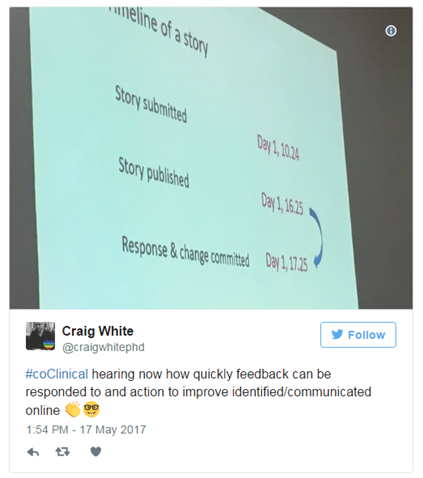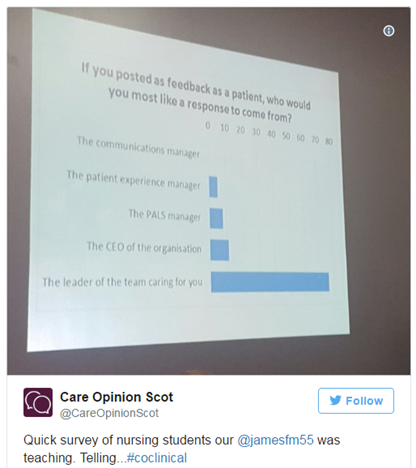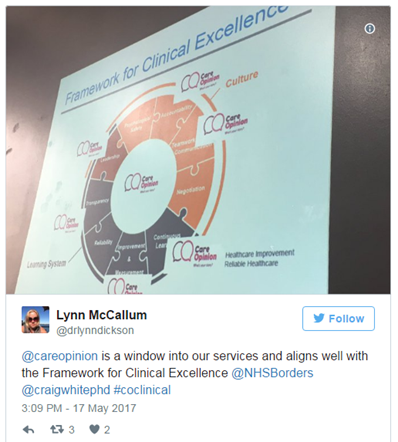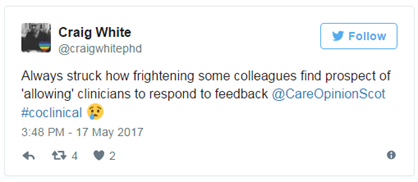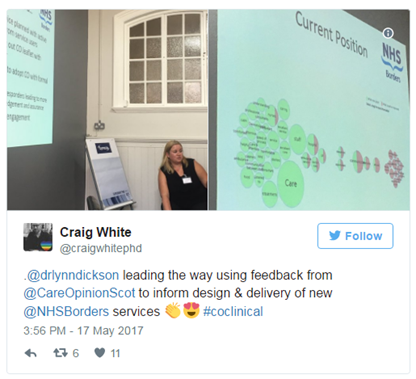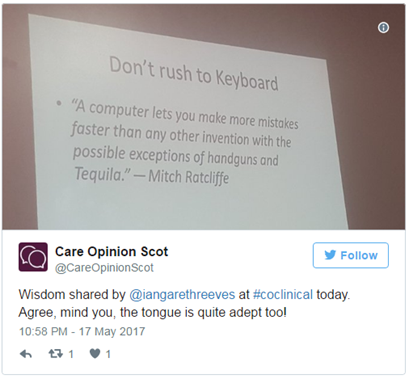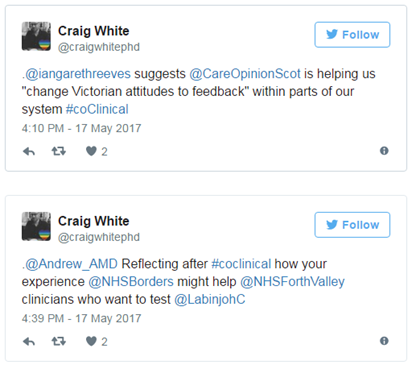On the 17th May a group of clinicians from Health Boards across Scotland gathered together to talk about their experiences of responding on Care Opinion, and encourage their curious colleagues to do the same.
We had a mix of speakers from Care Opinion, the Scottish Government, and clinicians currently using the service to respond to patients.
Kicking things off was Gina with some key stats about Care Opinion in Scotland. Since our inception in 2011 we have had over 8,000 stories from across Scotland, averaging 268 stories a month, with the frequency of submissions constantly increasing. 784 staff across Scotland currently receive stories, an increase of 48% from this time last year. Everyone was really impressed with the speed with which they can receive and respond to feedback!
Then it was James’ turn to talk about how Care Opinion has always been designed with clinicians in mind.
Clinicians were interested to learn how we make sure stories are getting to the right place and how it is possible to see who has read a story published on Care Opinion, but it was when James started sharing examples of some the great stories we have had over the years that the questions started to come thick and fast about how they can tell their patients about our service.
Important issues began to surface about how Care Opinion fits into current working practices, and one of the clinicians was really keen to get some patient voices into their department, as there can be conflict among staff about what exactly needs to be done to improve services. Seeing the patient as the expert in patient experience will go a long way for them to creating a unified view of service improvement requirements and changing the culture towards being more patient-centred.
Craig White stepped up to present the Scottish Government’s view on Care Opinion and the relationship between patient feedback and clinicians. It was great to hear the emphasis on empowering clinicians to receive and respond to feedback without going through an intermediary. Key to that was the way that using Care Opinion aligns with the current framework for clinical excellence:
Craig sees Care Opinion as a network of change agents, but we can only make the impact we are capable of when we are connecting clinicians with authors directly. Sometimes this can be a challenging culture change.
Then it was the turn of Dr Lynn McCallum to passionately make the case for clinical engagement based upon her own experiences in NHS Borders. No-one can resist her when she gets going!
Lynn has made using Care Opinion an integral part of developing a new department in Borders General and is a passionate advocate for the patient voice in service design.
Next up was Ian Reeves, a Consultant in Greater Glasgow and Clyde talking about how we finds using Care Opinion to speak to patients. There was lots of nodding in the room when Ian talked about how he felt patient engagement had been left behind by the standards of modern clinical medicine and how it is necessary to grasp the opportunity to embrace new techniques. It was great to hear Ian’s experiences and his advice for our aspiring responders.
Discussion turned to how to speak to patients and how apologies are an essential part of that. We heard about situations, in the past, where clinicians have been disciplined for apologising to patients. We talked about how sometimes it can feel like the patient’s perspective of what happened doesn’t reflect the truth of the situation, and how upsetting this can be for staff when it happens. It was really revealing to hear from clinicians how negative feedback affected them: hearing a critical voice of their work and their clinical skills and perceived commitment was really hurtful.
Some of our clinicians were philosophical about the problem of negative feedback, describing these incidents where feedback feels unjust as ‘just another of the bruises you pick up along the way when you are a doctor’. What was really interesting was that there was the feeling in the room that Care Opinion could be a way to support staff with these ‘bruises’ because the evidence shows that positive feedback far outweighs the comments that are critical of the service.
There was such passion in the room by the end we were heartbroken to bring things to a close, the venue staff were on the verge of carrying us out of the room! Can't wait for the next one.
Connecting Clinicians at #COclinical
Connecting Clinicians at #COclinical https://www.careopinion.org.uk/resources/blog-resources/4-images/adb2c26e54e944779cccdda240bd7396.png Care Opinion 0114 281 6256 https://www.careopinion.org.uk /content/uk/logos/co-header-logo-2020-default.pngUpdate from Care Opinion Scotland
Posted by Care Opinion Scotland, on
Thanks for your feedback.

